I want to note, though, that I am not a paid review or critic (that would be nice!) and am just a guy who likes writing about films. Because of this, I only see the films I have interest in. I don't have to see all the films out there. So there is almost a guarantee that I probably 'missed' a film that could of/should of been on the list; it's inevitable (I did want to see Argo but never got the chance). Without further ado, here is the list.
11. Jiro Dreams of Sushi
At the core of this film is about a fiery passion and a love of aesthetic craft. It is art form unabridged. What kept me engaged was the intense sense of duty Jiro, a legendary sushi chef hailed as a national treasure in Japan, maintains and has maintain for a very long time. There are many slow-moving tracking shots approaching Jiro, his chefs, and his sushi that let us regard the details of a man and his work. In addition, these obsessive tracking shots enable an ample amount of deliciousness to fall upon the viewer; the camera matches the delicacy of the art presented before it. This film encapsulates an admirable trait of Japanese culture and mentality. The ability to hone and master skills of one vocation and to pour your heart and soul into it is something many other cultures idealize but never practice. This film can easily connect with other Japanese classics such as Ikiru, Departures, and even Kiki's Delivery Service. Here we have an appropriate contemplation of a man whose life is his work and what a beautiful work it is.
10. Flight
Directer Robert Zemeckis loves his plane crashes. His last live action film until this one, Cast Away, featured an intense crash. Yet, his latest film, Flight, tops that because of its versatility. There are moments of harsh intensity and motion as the plane freefalls and barrel rolls. Then there are moments of stillness, as when the plane maintains a glide until it finally crashes into the ground. Momentum and acceleration are two physical properties used very well dramatically and, in watching this film with a slight fear of flying, I felt uneasy during the whole scene. I describe this scene not just because it is a perfect scene in the moment but it is also the visual metaphor of the whole film, itself. Flight is essentially a film about alcoholism akin to The Lost Weekend and Under the Volcano. Yet, its visual control and metaphorical subtlety coupled with a scathing performance by Denzel Washington creates a visceral story of catastrophe both physically and emotionally, as well with a hint of a religious tone (that I am still thinking about). I enjoyed how brutal of a film it was and there is a scene involving Whip (Denzel) and his son in a heated exchange that I found heart-wrenching and fiery. Although it has a good soundtrack (though some of the songs are too literal), listen to Stevie Wonder's song 'Too High' as it is a great companion piece.
9. Django Unchained
Despite what I have said in a previous blog, Tarantino's new film Django Unchained is still a powerful film for the better. QT has an unbelievable skill to meticulously formulate scenes of high tension, ironic comedy, and unsettling violence. His most recent work is no exception, and the film shines with the acts of Christophe Waltz and Leonardo Dicaprio with Jamie Foxx edging out the suave persona of a cold-blooded killer. The film is utterly brutal and one of the most brutal I have seen in recent memory and its attitude doesn't help. But, boy, does he make you cringe and tense your whole body for two and half hours. Disregarding the heavy moral implications of the violence, QT is consistent (possibly too consistent) in his form and knows what he wants and how he expects the audience to react. He lives vicariously through the films he grew up with and every shot expressed in his films is a derivative of something from the past. He ultimately weaves a painfully ironic tale of vengeance that punches us in the gut on the topic of slavery.
8. Cloud Atlas
Unfortunately, this supremely ambitious title flew under the radar for supposedly strange aesthetic choices, including having the same actors assume roles of different nationalities complete with different makeup. Maybe it's just me but the story, themes, and locales are all epic in every sense of is meaning; their weight suppresses such a minor detail. The film required much investment from the viewer, as you cannot regard one of the stories separately (I mean you could, but you won't grasp the narrative as a whole) because, as the film states, each story's significance ripples out over space and time to effect individuals of another era. The technical choices of the film were made with such torturous care to give each story a unique tone that meshed with a universality that created the general thematic construct. Its titanic nature can seem daunting to some, but I applaud its scope and vision because this same immensity is one of the reasons why going to the theatre is so damn exciting. We regard the larger-than-life presence with authentic superiority and domination but, if we allow it, we are caressed by the timeless and spaceless narrative of Cloud Atlas that seems to appropriately highlight those gargantuan themes as well as the small, subtle moments of individual emotion and discovery. It is hard to ignore and, for me, hard to despise. The film came and went, though, maybe too big for its own good.
7. Zero Dark Thirty
Kate Bigelow can easily be considered as one of the most prominent filmmakers of our time. Her ability to craft gripping tales of contemporary conflict has so far been unmatched by nearly any other filmmaker who has attempted to do the same. The Hurt Locker was a film that presented an unfortunately ironic mentality that fuels war. Zero Dark Thirty is very similar, except this time there is a very familiar source material. When I heard the announcement of the death of Osama Bin Laden, I was in a computer center in my school. Everyone working there stopped what they were doing and slowly approached the television screens. Silence commenced for an ample length but then statements and remarks were starting to be made by individuals about a myriad of opinions and feelings. I must admit there was a disconnect I felt when I heard the news as I stood there trying to grasp a formidable mentality that will comprehend an event that seemed so foreign in many respects. I remember thinking, "What now?" It is a tough case for me to say this in a brief synopsis, but there are moments in ZDT that remind me of that feeling. Along with an intensely suspenseful procedural, I feel Bigelow also tapped into a mentality forged and transformed over a decade of uncertainty and weariness. There is a tragedy within the core of Jessica Chastain's character, whose life seemed to have revolved around this one, disconnected man and then to kill him. There is austerity to the film's tone in the same way Kate's previous film had one. It is a conflicting film, but one that is certainly hard to ignore and one that I have come to terms with not in joy but in reverence.
6. Moonrise Kingdom
This film is easily the lightest film on the list. This is a compliment as it is a wonderfully enjoyable film. The story is the story and, not to say that there isn't any greater significance, what is being shown is essentially what is important, which is wholly great. Wes Anderson's film is constructed with colorfully rich set pieces, where the setting looks like we are peering into a doll house (fitting for such an adventure) and where the characters move through the space mostly in a two-dimensional manner, creating a unique aesthetic that is undoubtedly attractive. This film is saturated with infectious quirkiness and amusing eccentricities that create a tight bond with the splendid ensemble cast, including the two child stars who seem to embrace their role with the same odd curiosity that their director expresses. Moonrise Kingdom is an adventure film that feels fresh and is not afraid to be lighthearted. Though there are moments of intensity, Anderson rejects cynicism while also preventing to wade in drenching sentimentality, which ultimately leaves the crowd in a continuous state of pleasantry. Here is a film that is colorful in more ways than its visuals and authentically fun as a result. A fine comedy.
5. Searching For Sugarman
What an impossible notion to grasp that an artist can be literally unknown in his country of origin but then be one of the most famous and legendary artists in another country. At the same time, this artist is still virtually unknown outside of his music in the country that hails him as a legend. Imagine if we knew nothing of Eric Clapton as a person but, nevertheless, hailed him as a divine player of the guitar. This is what happened with a man named Rodriguez, who was the man sought after by the filmmakers of this emotional documentary. This film is not just a detective story seeking this unique musician but also a character study where one of the most amazing experiences in a film this year came with finding out who Rodriguez was and how he functioned. I sat there humbled by such a personality and in awe with the position his music and presence held. Roger Ebert stated in his review that the existence of such a story is necessary for us to see. I agree, especially as a testament to American popular music, to music in general, and to the power of the medium to communicate strongly in a certain place and a certain time. I also think its worth noting that the music is incredible and you should look up Rodriguez (also called Sixto Rodriguez) and explore his mysterious musical talent.
4. Beasts of the Southern Wild
Many regard the now Oscar nominated actor Quvenzhané Wallis as a, "force of nature." There is no doubt about that. I also feel that she is a, "force of human spirit." Beasts of the Southern Wild was the perfect fit for her, where the characters live in a dominion where they live to survive, forgotten by the rest of the world. Yet they love it and wouldn't have it any other way. The Bathtub, where Hushpuppy and her father live, is a land of raw and uninhibited human nature. The scene of joviality and celebration as Hushpuppy runs through the forest wielding two sparklers in her hands is an illustrious scene of human determination, which makes the conflicts later in the story that much more thoughtful and compelling. When watching the film I found myself eagerly scanning the world of Hushpuppy, which (really through a small budget but all the better) meshed a dystopic near-future and a world of familiarity; the level of detail in such a dichotomy in setting helps us intimately connect with the characters and help us underline Hushpuppy's unparalleled strength. This is the first film for Benh Zeitlin and the debut performance not just for Wallis but of the man who portrayed her father in the film, Dwight Henry. I only hope I can make a debut of such rawness and imagination.
3. Samsara
I must make a brief disclaimer for this one. It is 'technically' a 2011 film, as it premiered at the 2011 Toronto Film Festival. But...its nationwide release was in 2012 and reviewed by critics mostly in 2012. So, I'm giving the benefit of the doubt to a film by one of my favorite documentarians in Ron Fricke, Samsara. Using Fricke's own description, this film, along with his earlier film Baraka, is an elegy of humanity face to face with eternity. It is a audiovisual exploration into the deepest desires and struggles of humanity, what connects us all. Ron Fricke photographs his tapestry in a sagacious manner, in a manner of meditative spirit. We regard a plethora of breathtaking scenes with perfect aesthetic specifications. If there was ever a profound adventure into the nature of humanity, this film seems to look upon us as fragile yet elegant creatures seeking to find peace, pleasure, and interconnected-ness in this mysterious universe. I had the enormous pleasure to see this film in theatres. It was shot on 70mm film and so the screen was bigger than normal. It has been one of the most life-affirming spectacles I have experienced and every single image is not only a vision of grandeur but also a portion of a grand circular theme that can only be expressed through this sort of observation of life caught unaware. This film is a human document in the most truest of forms. There is nothing that can be rigidly conceptualized or sparsely generalized. What we regard can only and truly be felt from within.
2. Lincoln
The calculating sympathy of Daniel Day-Lewis's performance as Honest Abe is one of the great performances in the last decade. There is so much we can take from such a limitless performance, but the greater aspect comes not from what we can directly imply and observe but what we don't see. Lincoln is depicted as mysterious, as a man who is always thinking and always rearranging ideas in an obsessively meticulous manner. The fact that most of his extensive dialogue results in a story that, in the end, connects with the issue at hand speaks volumes to the character's insistence on Euclid's tautology, where if two things are equal to the same thing then, they themselves, are equal to each other. Jim Emerson, in his thoughtful essay, mentions the spatial and geometrical consequences of this tautology within the film's context of scene construction. Most of these arrangements have the focal point as Lincoln, who represents the convergence of two sentiments which were thought to be unrelated or thought to be crass in trying to connect them (American democracy and racial equality). It is a political stance, but one that draws from simplicity and care for the human condition with this man-made institution. All this is shown with an antiquated elegance by master cinematographer Janusz Kaminski, who seems to set up most of the shots like a Thomas Eakins photo. Spielberg has made his strongest film since Munich, and lets the grandiose performances govern the immensity of the subject matter. Here is a film of history that carries a significance that is scathingly relevant today.
1. Life of Pi
When a film holds within itself a vast sense of wonder, a viewer can easily let go and immerse themselves into the world it creates. Sights and sounds coalesce into a sense experience that is felt strongly through compassion. Ang Lee's Life of Pi dazzled me from beginning to end. I was left at some points busily exploring the screen that was both definitive and illusory. This was my first 3D film, and I was incredibly happy I got to experience the film in 3D. The extra dimension highlighted such illusory symbolism as we watched Pi survive turmoil after turmoil with Richard Parker (the tiger), a relationship that was both necessary and brutal. This film was made by the imagination and for the imagination, one that challenged our strength to believe and to hold a certain truth within us through faith. In some ways, that is the strongest testament to human will, to understand something in the face of chaos and uncertainty that would seem to provide no explanation. I could see people having a problem with this, and with my family who watched with me, they did, but they are missing the point when they try to find logic to such an ordeal. Through this, I feel Lee's ambition and motivation. Life of Pi is a tale about humanity because of what it asks us to do in the end. There are no data points to scan, no lines of reasoning to hold on to, no sort of logic to generalize the story, there is just our strength to accept and understand a story about struggle, loss, and survival. What a delicate narrative to construct, though, and how beautiful it was done by a director who weaves his tale with human tenderness. And what a feast it was to behold, a masterpiece of a vision that is ambitious, gentle, brutal, and provocative.
------------------------------------------------------------------------------------------------------------
So, the Oscars are next month and this time around I am excited because I would like to see the films and people that deserve credit to be given credit. This is a strong group of films and I am happy to see all of them. If you want predictions, let this list be a good indication as to what film will take the top prize. Do you think that will happen? Probably not, but I feel there is not a clear-cut winner as there was the past two years (in which those two films were good but not great). Even more important, I hope this is a trend that does not stop anytime soon (or at all, for that matter). It is always a good thing to go into the theatre with a sense of wonder and to come out with even more of a sense of wonder, something I think each film on this list did for me.
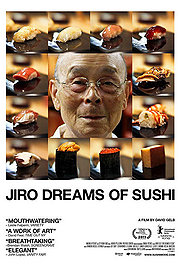
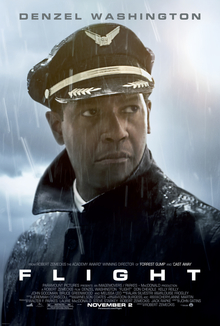

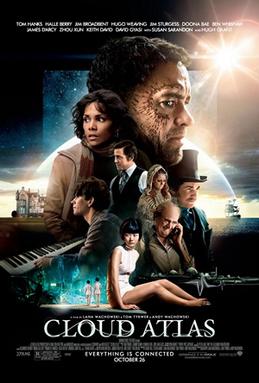

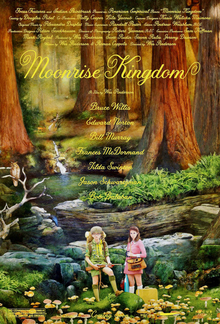
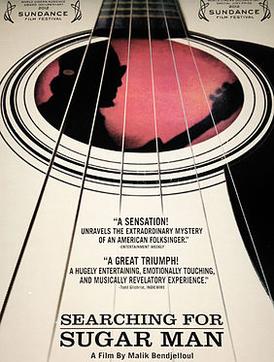



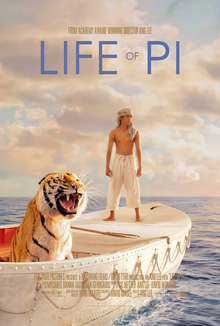
Great reviews! I have seen four of these outstanding movies and I do agree with your opinion on each one of them. Very talented my son.
ReplyDelete